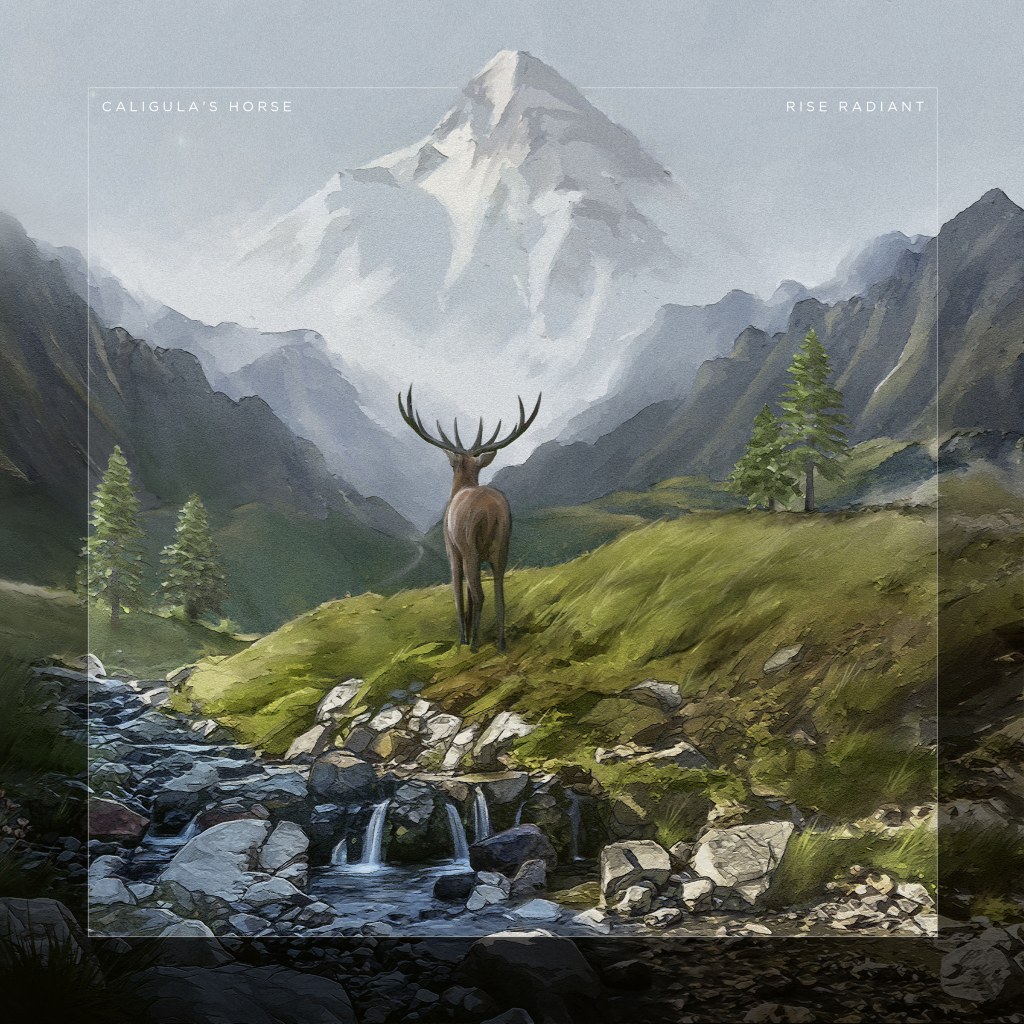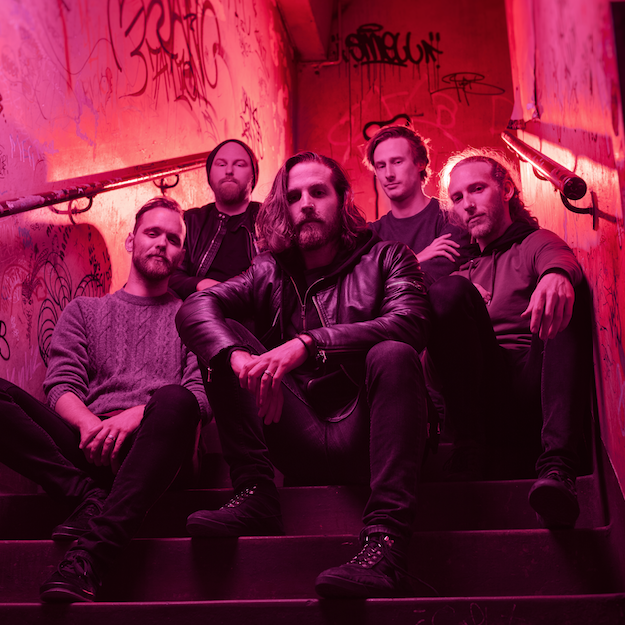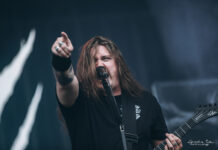With the release of CALIGULA’S HORSE‘s album #5 that goes by the title “Rise Radiant,” we took the opportunity to ask bass player Dale Prinsse a few questions about the band, their musical stylings, and influences. We also had an in-depth discussion about the themes of the album, the meaning of the songs, the songwriting process, and touring. Check it out below:

Hello Dale, how are you doing?
Hey there, it’s fantastic to have a chat with you. We’re a few days out from releasing “Rise Radiant” and the vibes are great.
How would you describe the last couple of years for the band?
Despite only joining the band last year, my ties with CALIGULA’S HORSE go back to 2011 when “Moments from Ephemeral City” was released, so in my eyes, the band’s trajectory from the release of “In Contact” has really solidified us as a prominent progressive metal band. We’ve seen this through the ever-increasing rise in our listenership since releasing that album and touring throughout Europe, Australia, and Latin America.
“Rise Radiant” is your fifth album in only nine years. Where does all of that creativity come from and where do you draw influences from when it comes to writing?
Sam [Vallen]’s attitude to writing is pretty awesome. He’s always believed that as a band we should be able to produce new music every couple of years, and we’ve stayed relatively within that framework.
Our influences in terms of writing come a lot from Steely Dan, Jeff Buckley, OPETH… but really there are a lot of abstract influences for us; artists who approach songwriting in new and creative ways that aren’t necessarily linked to progressive metal. I particularly love the creativity involved in different songwriting structures too. A lot of CALIGULA’S HORSE uses through-composition that establishes, evolves, and explores a central musical theme (like “Salt” and “The Ascent” for example), or otherwise more popular song structures to express our take on what can be a fun way to construct a song. Sometimes an idea needs time to fully be realised and other times it just fits in these more concise forms.
How would you describe the new album, comparing it to the previous ones? Would you say that it is different from the previous ones or do you believe it’s just the next logical step in the discography of the band?
By now we hope that people can immediately think “that sounds like a CALIGULA’S HORSE song.” Our identifiable markers on “Rise Radiant” are what you’d expect from past records – meaningful lyrics, heartfelt songs, and powerful riffs. I think the aggression and intensity has been dialled up a notch compared to past albums though, so in that regard it’s just a step in a direction.
Speaking of writing a record, how is that dynamic within the band? Do you write material individually or do you get together and then start writing?
The idea for the main groove in “Salt” came from a riff that Adrian [Goleby] had written at home and when Sam [Vallen] heard it, it sparked this quick formation for the verses and choruses of the song. “Resonate” was a big vocal idea that Jim [Grey] had written too – that one was in the pipeline for a while until we realised its place in the album. “The Tempest” was a bit of a collaborative effort between Sam and I, as he had the basic ideas for the intro and then we honed-in on the verse/chorus through a single session. The rest of the time, Sam is the instigator of an idea and develops sections of music that we slowly chip away at through discussions and refinement, but he really is the central idea’s man and arranger/composer for CALIGULA’S HORSE.

What can you tell me about “Rise Radiant” in terms of lyrical content? Is there an overarching theme or any common ideas within the songs?
I love talking about the overarching themes with “Rise Radiant.” The title is really a commandment: get up and shine brighter than before. It’s about finding strength and independence while knowing from whom to seek help and lean on. It’s about community and this domino effect you can have by radiating strength in the world.
It’s also very personal, more-so than past albums. Songs like “Salt,” “Resonate,” and “Valkyrie” all come from these messages to yourself to remain strong, seek help, slow down, and not pressure yourself, to live in the moment. Songs like “Autumn” and “The Ascent” point to perseverance and overcoming adversity, and at the same time they deal with legacy and the paths we lay for our children. Legacy is a recurring theme in CALIGULA’S HORSE (think “Dream the Dead”) and it focuses on asking yourself, “what effect will I have on the world and what will I leave when I’m gone?” These sorts of existential questions challenge us to better ourselves and work hard in this world.
Generally speaking, what is more difficult to write – the melodies or the lyrics?
I’d say neither can generally be harder than others. “Resonate,” for example, was entirely a melody in its formative stages, literally just a vocal line. Sometimes the melodies come naturally because of the way Sam employs this voice leading arrangement technique which leaves an obvious place for a melody. Other times when sections are quite sparse and there’s a lot of room to move, it can be tricky to get the exact perfect fit. The short answer is sometimes it comes together straight away, sometimes it takes weeks of struggling to get the right thing.
To promote the album, you released the music video for “Slow Violence” and audio tracks for “The Tempest” and “Valkyrie.” How difficult is it to decide what songs should preview a new record and what made you choose these ones?
Great question. Our approach this time was to kick the door down, so “The Tempest” made the most sense to us for a “we’re back” message. “Slow Violence” has the benefit of three choruses with a really catchy melody in around four and a half minutes and that makes for a great single. “Valkyrie,” too, made sense in the weeks leading up to the release of the album because it hits really hard.
Why did you choose to use only the audio for those two tracks and not do full music videos?
Music videos take a lot of time to organise and we wanted to focus our energy on producing something with a significant impact for “Slow Violence” – something we’re very happy with in retrospect.
Listening to the album, “Salt” and “Autumn” stand out as being the most atmospheric and emotional tracks. What can you tell me about them?
The composition and arrangement of “Salt” is really intricate and it has this tightly wound orchestration. The song itself deals with suicidal thoughts, something that myself and Jim have experienced through the years. But what we necessitate in lyrical writing is providing a spin at the end of songs. It’s all well and good to discuss these dark topics, but there has to be a light at the end of the tunnel for a topic like suicide and depression, which is why that community and communication I was discussing earlier is so important. The mantra is, if you can just reach out and contact a friend or seek help through therapy or medication, you can make it to the morning and live another day. And if you keep doing that, you can find yourself in a totally changed mental health space.
“Autumn” is a song about change and new life; it’s almost the antithesis of “Salt.” Autumn, as a season, is a period of transition that directly relates to our positions as individuals in CALIGULA’S HORSE. The periods between “In Contact” and “Rise Radiant” really feel like a watershed moment for the band and Sam having a child during the making of the record particularly influenced the writing of “Autumn,” which is written about the markers we leave for our children so that the paths they forge in this world might be easier.
I really like the bass sound in your music; it’s comparable to JINJER, SEVENTH WONDER, or DYNAZTY. How do you manage to get such a clear sound?
I could talk about this for ages [laughs]! I’m familiar with JINJER but a lot of the distorted tones I go for are more akin to John Stockman from KARNIVOOL. I think Forrester Savell’s work with John Stockman on the “Sound Awake,” and “Themata” records really solidified bass tone as a journey for me. The tone of “Rise Radiant” is due immensely to the incredible basses made by Dingwall guitars. They’re really setting the stage for contemporary metal and rock bass tones. I’m always heavily critiquing and improving my Fractal Ax8 cabinet simulations too. I like to hear the air move in a bass tone, but I also like the attack to be really consistent and aggressive from the bass guitar rather than the effects, which is partly why I started using a pick recently.
The cover artwork is very peaceful and tranquil and I feel it’s really in tune with the music. Did you give the visual artist any guidelines or did you give them a free hand in designing it?
We had these Sisyphisian ideas towards the end of writing, particularly after “The Ascent” was written, and some of the imagery was formed out of this video game that we were playing called “Celeste,” who is this character that overcomes her anxiety by climbing a mountain. Sam and Jim tossed around this idea of ephemeral North American National Park imagery, and so the guidelines for Chris Mangos (who also did “Bloom”) was to create something in this style. We chose the deer as this anthropomorphic metaphor of fragility, elegance, and posture that is looking up at this impenetrable and foreboding mountain. Chris’ design came together so closely to what we envisioned and we love him for that.

For many listeners, the content of the songs can mean a variety of things that are easy to identify with. Do you often hear feedback that a listener thinks a song tells about their life or that a song has played a greater role in their life?
Honestly, having been in the band for over a year now it still blows me away that our music can have a profound effect on people’s lives. Music is used in so many ways that mark moments, what you might call “musical priming.” I think people identify with our music because it’s quite revealing and we strive to deliver our message as sincerely as possible. “Graves” is a perfect example of that and in a way, that song might be seen as this early precursor into how we approached writing for “Rise Radiant” – really tapping into these personal things that are rarely talked about in popular music.
A tour is always tedious for a band but it can be full of adventure. Is there a moment or an incident that you remember and laugh about?
There are too many moments of hilarity on tour with CALIGULA’S HORSE. One of them that comes to mind though was this crazy bus driver that had night terrors on our European In Contact tour. He woke up screaming in his bunk, scared the living daylights out of me as he grabbed my arm in the middle of a deep DEEP sleep, and then immediately went back to sleep. The entire tour party burst out laughing except for me, but in hindsight…that was one of the funniest experiences I’ve ever had.
Speaking of, you have toured with such bands as OPETH, MASTODON, THE DILLINGER ESCAPE PLAN, PROTEST THE HERO, and NE OBLIVISCARIS. Is there anything that you’ve learned from them, music-wise or business-wise?
OPETH have been life-long heroes of ours and the lessons you learn from a band with that much prestige is that a cohesive unit of friends is the ultimate guide to success as a band. They’re also ridiculously tight live, so that’s always a reminder to constantly improve your musicianship. NE OBLIVISCARIS are good friends of ours and we just love hanging out with them.
As a follow-up, what do you think makes a good songwriter and what makes a good musician? Can those be different?
Yeah, definitely. A good songwriter is often sincere and honest in their intentions, but above all, as a listener, it’s easy to sense when a musician isn’t connected or sincere with their performance. I think you can be a great musician and not a great songwriter, but probably not vice versa. If you think of conductors right, they have this ability to understand many instruments, yet might not be as technically proficient as the people who perform in the orchestra. Many EDM producers don’t play an instrument, but consider their laptop as an instrument. These definitions are slowly changing as technology and music develops. I often consider myself a musician before I consider myself a songwriter because I struggle to construct a full song – that’s why working in CALIGULA’S HORSE is such an incredible place for me, because I can create ideas that are taken to a level I never thought possible by collaborating with Sam, Jim, Adrian, and Josh.
Finally, is there anything else you’d like to share with our readers?
Thanks a lot for checking out the interview guys, I hope you’re staying safe, and thanks for supporting Aussie music!
Interview by Andrea Crow





